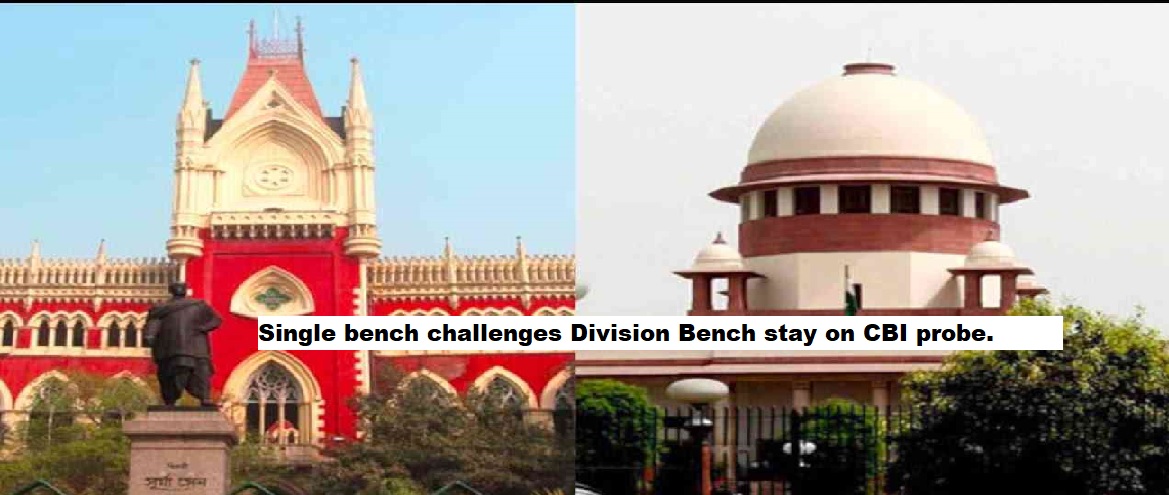


In an unprecedented move, a 5-judge bench of the Supreme Court convened a special session on a Saturday to address what it deemed as unusual developments in the Calcutta High Court. Taking suo motu cognizance, the Supreme Court decided to intervene in the ongoing proceedings before the Calcutta High Court, specifically in a case where a single bench had disregarded a stay order issued by a division bench.
The root of the matter lies in an order passed by Justice Abhijit Gangopadhyay of the Calcutta High Court. Justice Gangopadhyay, in a controversial move, ignored an order from a division bench that had stayed the single bench's decision calling for a Central Bureau of Investigation (CBI) probe into alleged irregularities related to admissions in medical colleges in West Bengal.
The 5-judge bench of the Supreme Court, presided over by Chief Justice DY Chandrachud and comprising Justices Sanjiv Khanna, BR Gavai, Surya Kant, and Aniruddha Bose, undertook the task of hearing the suo motu matter during this special Saturday sitting on the 27th of January. The Court decided to intervene, issuing notices to the State of West Bengal and the original petitioner before the Calcutta High Court, and subsequently staying all further proceedings in the writ petition, Letters Patent Appeal, and the implementation of the single bench order referring the investigation to the CBI.
Senior Advocate Kapil Sibal, representing the State of West Bengal, informed the Court that the State intended to file a Special Leave Petition against the initial single bench order for a CBI enquiry. Meanwhile, Abhishek Banerjee, a Member of Parliament from the Trinamool Congress (TMC), expressed his discontent with the single judge's order as his name was implicated in the matters. The legal proceedings took a complex turn as various parties, including the State of West Bengal and a prominent political figure, sought to challenge or support the single bench's decision.
Solicitor General of India, Tushar Mehta, weighed in on the matter, expressing concerns about the manner in which the Division Bench had passed the stay order. According to Mehta, the appeal had been entertained without a proper appeal memo, raising procedural objections. He clarified that his intention was not to defend either the single judge or the division bench order but to highlight the procedural irregularities. Mehta sought permission for the CBI to file a note on the matter, a request that the Supreme Court bench granted.
Interestingly, the division bench in the Calcutta High Court had taken a proactive step by instructing the High Court Registrar General to submit a report explaining why the division bench's stay order had not been communicated to the single bench in a timely manner. This move by the division bench indicated an awareness of the procedural lapses and a commitment to addressing them. The Supreme Court's intervention added another layer of complexity to the unfolding legal drama.
As the legal proceedings unfolded, the Supreme Court's decision to stay all further actions until Monday showcased its commitment to thoroughly examining the situation and ensuring a fair and just resolution. The involvement of high-profile legal representatives and political figures added a layer of complexity, emphasizing the broader implications and potential political ramifications of the case.
In conclusion, the suo motu intervention by the Supreme Court in the Calcutta High Court proceedings reflects a commitment to upholding the rule of law and maintaining the integrity of the judicial process. The case, involving a single bench's defiance of a division bench stay order, has garnered attention not only for its legal intricacies but also for the broader political context in which it is unfolding. As the legal saga continues, the nation awaits the Supreme Court's further directives and the resolution of this unprecedented situation in the Calcutta High Court.
TAGS: Supreme Court 5-judge bench Special Saturday sitting Suo motu cognizance Calcutta High Court Proceedings Single bench